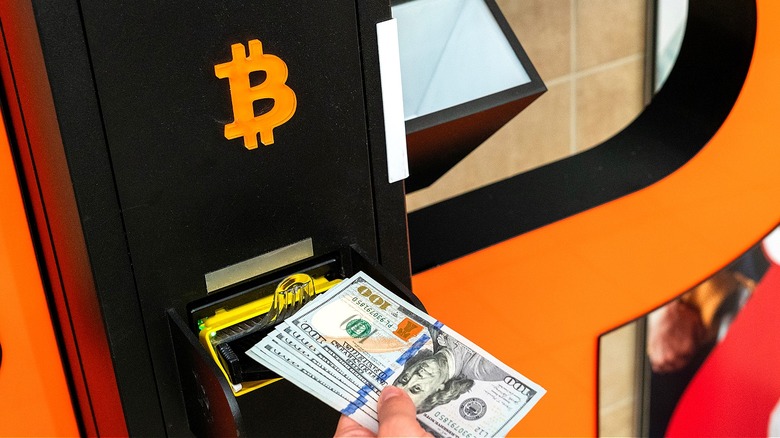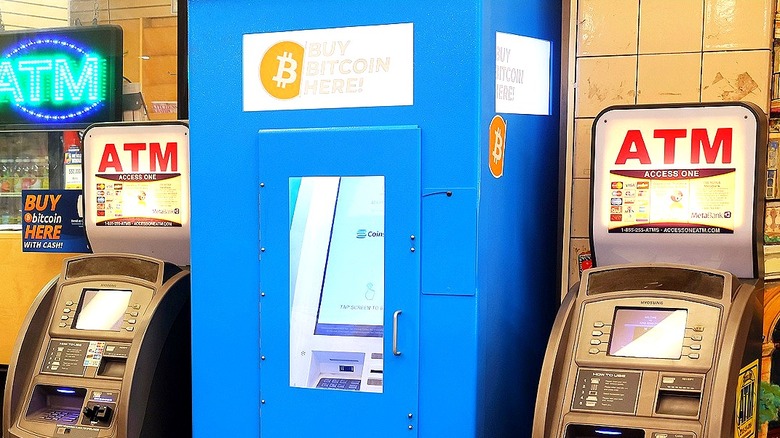Don't Fall Victim To The Alarming Bitcoin ATM Scam Going Around
Bitcoin ATMs are making their way into more American cities these days. According to Coin ATM Radar, there are roughly 31,500 of these machines in the U.S., allowing cryptocurrency users to conduct digital currency transactions in public like never before. The rise of these tools has made the marketplace for crypto assets more prominently positioned, but it's also introduced a brand new kind of scam that Americans should be wary of.
Scammers have always worked to target new and misunderstood technologies and tools, including the arena of cryptocurrency. As shiny new toys roll out into the commercial marketplace, consumer knowledge of their totality of use may not be completely developed, leading to a gullibility factor that simply doesn't exist in other parts of the consumer experience. While plenty of people now use and understand cryptocurrency assets (at least in part), the use of ATMs and the crossover between crypto and traditional financial institutions, given the expansion of these decidedly non-digital machines, has created a niche scam opportunity.
A new threat going around preys on misunderstanding, and weaponizes a key feature of cryptocurrency to steal from unsuspecting victims. Because crypto assets are decentralized, and transactions are made in such a way that transfers cannot be reversed, conning victims through the medium of bitcoin ATMs is both lucrative and often totally anonymous. There's little recourse a victim can take to make themselves whole again, but there are some telltale signs that can help you avoid becoming victimized in the first place.
Spotting a bitcoin ATM scam
First and foremost, this cryptocurrency scam falls flat on its face when you remember that (per the FTC) the federal government will never instruct you to move your money. But the basic pitch of the scam is of an IRS worker or some other federal employee who makes contact to raise the alarm on an active scam that's targeting you. They'll tell you that thieves have gotten access to your bank account or passwords, and it's crucially important that you move your money so that it can be protected. The going theme is that the federal government maintains a secure bitcoin account that can be leveraged to secure your assets. Transferring your capital into this cryptocurrency wallet will protect it against the thieves who are actively working to make off with your hard earned cash.
This is a lie, and the reality is that the pitch is doing exactly what the false government employee is suggesting others are trying to achieve. In truth, if you rush to a bitcoin ATM to transfer your money to this "secure" account, you'll simply be sending your money directly to the thieves. These scams rely on a few key features, so keeping your ears open is crucial. Most importantly, they'll seek to rush you and infuse panic into the conversation. Any time you speak with a federal representative you're going to be greeted with a calm, perhaps even disinterested tone of voice. Anyone who speaks with alarm in their voice and asks you to do something with your money is a thief trying to instill fear in you. (Read about phone scam phrases you should never respond to.)
Along with money, personal data can be stolen, too
As reported in an FTC data spotlight from September 2024, losses from bitcoin ATM scams in the first half of the year totaled more than $65 million, with $10,000 being the median amount lost per consumer. But, the problems associated with this particular bitcoin scam don't end with a potential loss of transferred funds, unfortunately. Note that these cryptocurrency tools aren't well-regulated, and the physical assets themselves are subjected to frequent attacks.
In the same way that gas pumps and store card readers are sometimes fitted with card skimmers designed to steal personal data, bitcoin ATMs can ultimately be breached by hackers, revealing the personal information users provide when making transactions through the machines. At the top, there's the obvious risk of altered destination addresses. Whether you're using one of these ATMs as the victim of a scam or a routine crypto enthusiast, it's possible that a hacker has manipulated the programming of the device to input their own bitcoin wallet address as a recipient, siphoning off funds covertly with each transaction or stealing transfers entirely.
Note that Social Security numbers and facial IDs are also required at many ATMs to comply with federal law surrounding the use of cryptocurrency. This means you're potentially giving away critical personal data to malicious actors when conducting routine cryptocurrency business through an ATM rather than on your own personal device. (Learn about 11 financial scams senior citizens should be aware of.)


